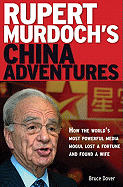
 Bruce Dover's book is vastly informative about the challenges Western corporations face in doing business with China. Dover, who worked on Rupert Murdoch's China projects during the 1990s, has learned much, often the hard way, and writes with authority. His experience taught him that trusted relationships must be built slowly, stability is highly valued and efforts to save face are essential. And he slowly grew to understand that when a bureaucrat ominously utters, "Giants who seek to walk in China need to learn to tread lightly," it is wise to appreciate the nuances of the statement.
Bruce Dover's book is vastly informative about the challenges Western corporations face in doing business with China. Dover, who worked on Rupert Murdoch's China projects during the 1990s, has learned much, often the hard way, and writes with authority. His experience taught him that trusted relationships must be built slowly, stability is highly valued and efforts to save face are essential. And he slowly grew to understand that when a bureaucrat ominously utters, "Giants who seek to walk in China need to learn to tread lightly," it is wise to appreciate the nuances of the statement.
These hard-earned lessons were often wasted on Murdoch as he fought for a foothold in the billion-customer Chinese television market. Buying STAR TV from Richard Li in 1993, he expected to penetrate the mainland market using his usual hardball capitalist methods. Dover reminds us that "no tycoon has been more aggressive or more successful in expanding an empire across multinational boundaries," and Murdoch had no reason to doubt he would succeed once more. In China, however, even Murdoch had to alter aspects of his standard approach if he hoped to have a prayer at success: he violated his golden rule ("Never own anything you don't control"); and, he also rolled over and showed his belly when Chinese politicians asked him to pledge efforts for a "positive and constructive relationship."
Despite Murdoch's money, self-assurance and persistence, none of the concessions he made to Chinese bureaucrats worked, and his expensive China strategy collapsed. The disastrous end to Murdoch's China Adventure is a case study in how not to enter a market as complex as China and, for Murdoch's many detractors, will provide the guilty pleasure of Schadenfreude.
Dover offers other guilty pleasures. He has the distinction of having introduced a young intern at STAR TV, Wendi Deng, to Murdoch on July 1, 1997. By June 25, 1999, Wendi was the new Mrs. Murdoch, and Dover saw his influence dwindle. Whether or not wounded pride plays a role, Dover has a passive-aggressive field day with unflattering anecdotes about his ex-boss. The short version is that Murdoch, like most fallen idols, has feet of clay; the longer version is that Murdoch's blunders in China, according to Dover, stem from his cultural ineptness, arrogance, impudence and impetuousness. It's a good thing for Dover that Murdoch, so he claims, never reads about himself.--John McFarland

